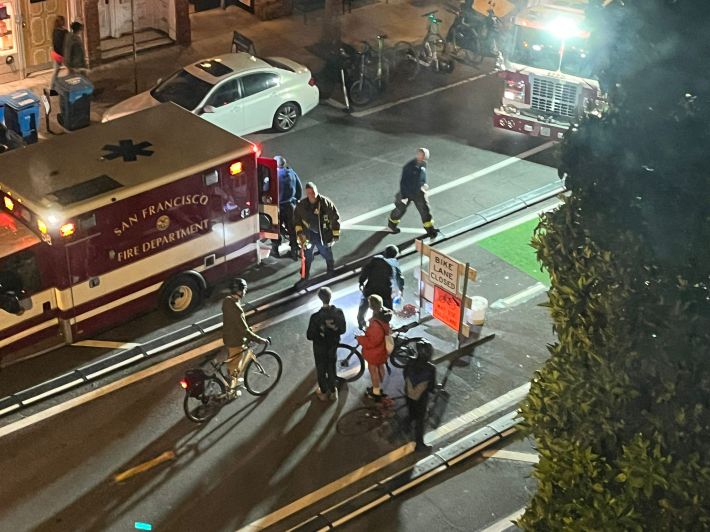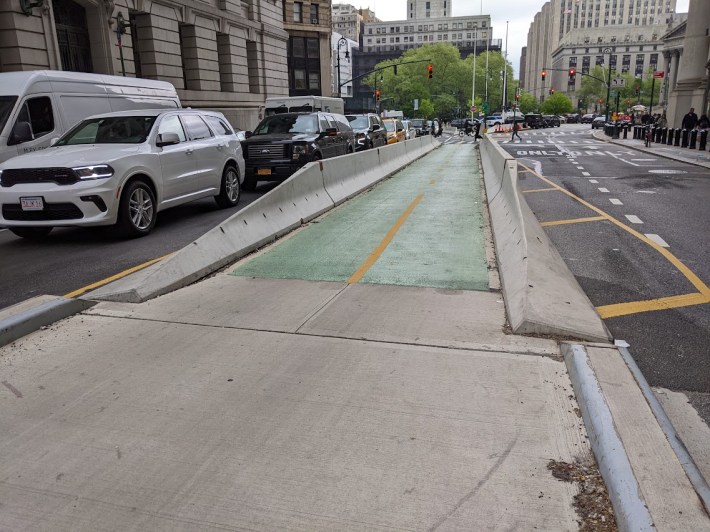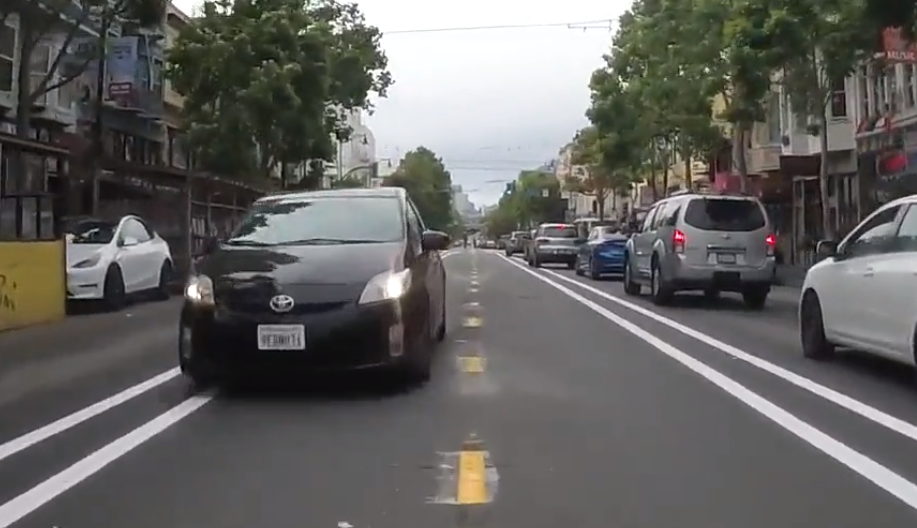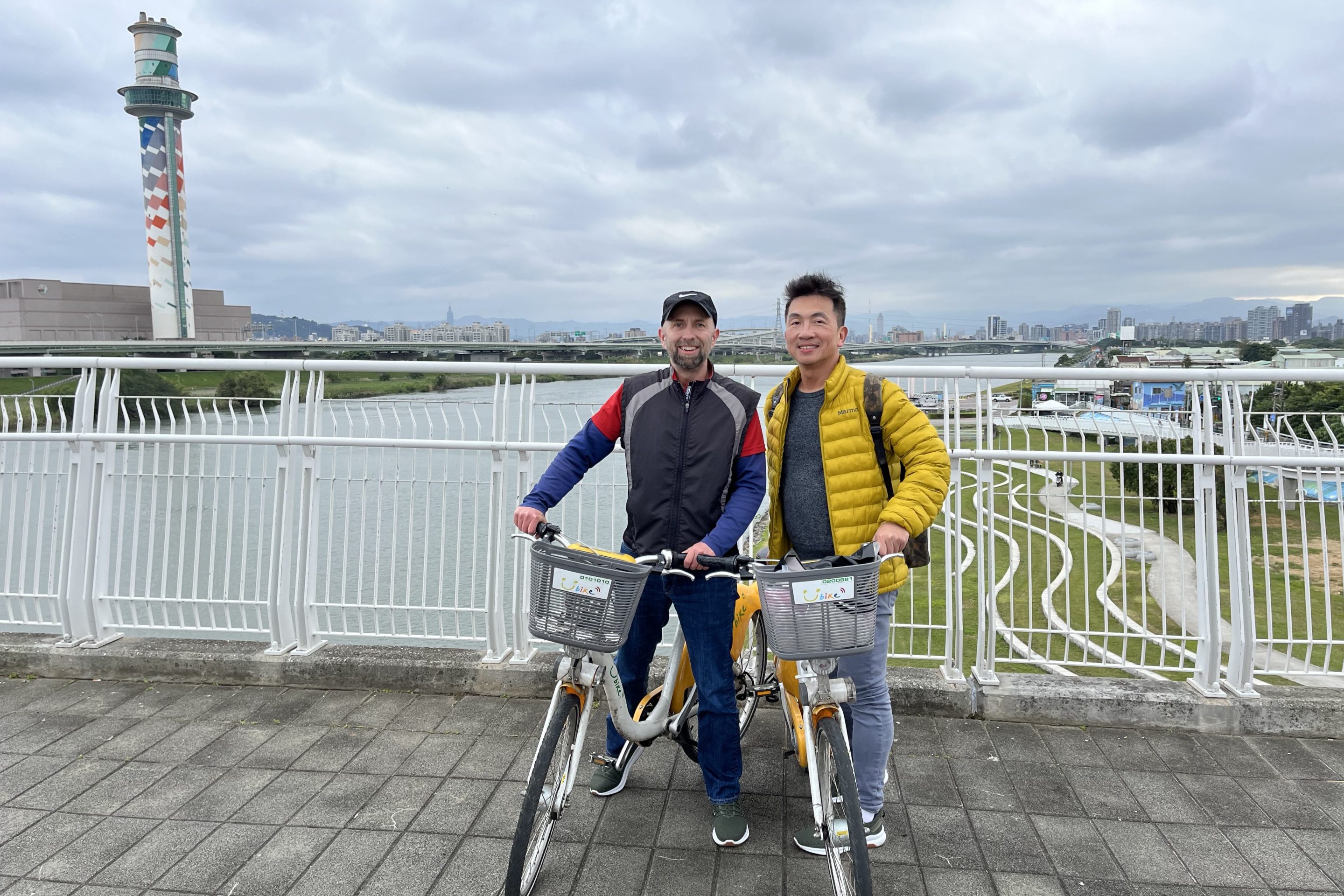Note: GJEL Accident Attorneys regularly sponsors coverage on Streetsblog San Francisco and Streetsblog California. Unless noted in the story, GJEL Accident Attorneys is not consulted for the content or editorial direction of the sponsored content.
Streetsblog readers are sending a steady stream of reports of terrifying close calls on Valencia Street, in addition to two confirmed crashes, thanks to SFMTA's botched roll out and deadly center-running design.

The latest comes from advocate Tim Courtney, who was riding his bike on the center-running lane when a motorist used it overtake traffic congestion. Imagine the results when drivers do the same thing from both directions. Or if the driver was drunk or a tad more aggressive. Imagine what happens when the bus curbs are installed and motorists will have no problem continuing to use the bike lane, but cyclists will be unable to do an escape maneuver.
Turned onto Valencia at 17th. To my surprise, the ill-conceived @SFMTA_Muni center bike lanes were installed, OPEN, and un-protected.
— Tim Courtney (@timcourtney) June 28, 2023
Who could have predicted what happened next?
What a negligent, dangerous implementation. pic.twitter.com/VN8eeJ5nfp
Things are so egregious on Valencia that it's attracting international attention. The founder of the Copenhagenize blog and consultancy Mikael Colville-Andersen took time out from his charity work in Ukraine to blast SFMTA-Director Jeffrey Tumlin's center-running plan. This Tweet below was in response to a question about whether the crashes were a result of bad roll-out or a bad design.
Both. Lazy-ass solution from people who consider bikes an irritation. Best Practice infra benefits shops and urban life. This crap wants cyclists to barrel on through and fuck off https://t.co/5sLiusikuy
— Mikael Colville-Andersen (@colvilleandersn) June 22, 2023
He told Mission Local the design is "the worst infrastructure I have ever seen anywhere in the world."
I'd say it's a title competitor.
I was in Leipzig at the Velo-city conference when the installation began. More than one Dutch transportation expert shrugged and told me something to the effect of "if San Francisco isn't interested in international best practices, there are plenty of other cities that can benefit from our experience."
I’m a proud SF cyclist. Always will be.
— Alex Danilowicz (@alexdanilo99) June 23, 2023
But this new diagonal bike lane on 23rd & Valencia is a failure and dangerous.
I was recording because I have a genuine question for @sfmta: what do you expect to happen when the light turns green? pic.twitter.com/ufHfTZEIJa
But for readers who think they know better than the Dutch and the Danish about how to design safe streets, I want to point out something I thought would be obvious about a center-running bike lane. It's illustrated by Courtney's video: putting bike lanes in the center of the street increases the likelihood of a car-versus-bike head-on collision. When those happen, cyclists don't often survive. That's why in those rare situations where a center-running bike lane is necessary, such as in New York on approaches to some of the city's bridges, they use giant concrete barriers.

Instead, SFMTA is installing bus curbs that create reverse permeability: cars have no problem driving over them (as seen in the Tweet below) but cyclists will be trapped. This alone should have been enough to make the plan a non-starter.
Valencia bike lane curbs working as planned so SFFD can use the lane for parking for lunch pic.twitter.com/yijeiqIknj
— Andy (@Shenanigans_ATL) June 18, 2023
But Tumlin pushed through his plan, convincing even many advocates that this was the only option because things had changed politically after the COVID pandemic. Recall that in 2020 the city was ready to move forward with a plan to extend the Dutch style, protected bike lane pilot between Market and 15th, only with protected intersections as well. The only thing that really changed politically, as best I can interpret from background conversations with city officials, is that Mayor London Breed, understandably overwhelmed with the many crises facing San Francisco, gave Tumlin carte blanche at SFMTA.
The man is, if nothing else, incredibly persuasive. Tumlin tried to convince me to be "open minded" about center running as long ago as 2019 (obviously before the COVID pandemic, parklets, and all the other excuses he gave for abandoning the Dutch-style plan). But I had no idea he fetishized the idea to such an extent that he'd push it through in a wholly inappropriate circumstance: on a merchant corridor such as Valencia.
Yes, they also use them in Barcelona--which has a similarly paltry bike mode-share to San Francisco--and some countries in South America. But conscientious planners emulate what works the best for mode share and safety, not what doesn't. In other words, when the Dutch and Danish tell you something is a bad idea, have the humility to listen.
SFMTA officials and even the San Francisco Bicycle Coalition have made it clear they're okay with trying it anyway and "iterating" with the design. I don't know how else to interpret that, except to mean that they are literally okay with experimenting with the lives of people who bike, including children.
That is not remotely okay.
Plastic straws have been added to Valencia’s center cycle track to “protect” people.
— Luke Bornheimer (LukeBornheimer@sfba.social) (@LukeBornheimer) June 28, 2023
Who’s volunteering to be the guinea pig…? pic.twitter.com/9V4SIK1LhL
At the SFMTA board meeting last April, Tumlin and SFMTA staff made it clear they won't replace the lanes even if people are seriously injured and killed, but rather will continue to "iterate" and adjust. That's just evil: good, off-the-shelf Dutch and Danish designs are intuitive and self-enforcing and don't require an adjustment period to prevent serious injuries. In fact, that's an underlying principle of Vision Zero.

Given all this, and as more blood is spilled on Valencia and the close calls mount, I implore readers: don't ride on it.
Take BART or the Muni 14 through the Mission. Or walk. Or patronize businesses elsewhere. But don't bike on Valencia, even if it means--and I can't believe I'm writing this--taking a car instead.
I don't want to write a big exposé about another victim of SFMTA's incompetence. I've written enough of those.






